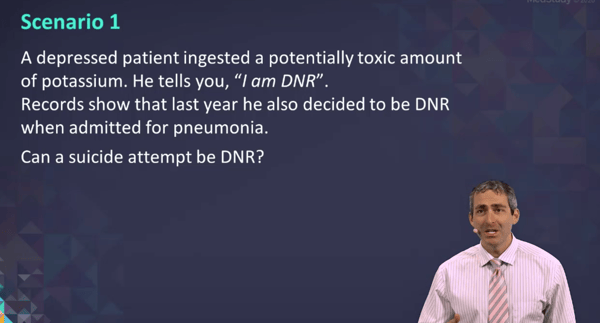Scenarios in Ethics and Palliative Care: Can a Suicide Attempt Be DNR?
.png)
When you flip through the Hospital Medicine Basics syllabus and watch the videos, you will come across a section called Scenarios in Ethics and Palliative Care. In this section, Dr. Gil Porat takes scenarios from the Ethics Section of Internal Medicine Core and drives home some key points in ethics in medicine. The situations discussed in Hospital Medicine Basics are practical scenarios, you will most likely see similar situations if you work as a hospitalist.
The situations that are presented usually have an accepted standard of care. So, they not only make good test questions, you also want to make sure you are making decisions along the accepted standards of care.
"I graduated from residency in 2002 and have had these scenarios arise recurrently throughout my hospitalist career." —Dr. Gil Porat
Scenario 1: Can a Suicide Attempt Be DNR?
The first scenario in Hospital Medicine Basics is concerning a depressed patient who ingests a potentially toxic amount of potassium. He then tells you that he is a do not resuscitate (DNR).
You take a look at his records and see that he decided to be DNR last year when he was admitted to the hospital with pneumonia. The question here becomes, can a suicide attempt be a DNR?
 Dr. Gil Porat discusses practical scenarios regarding ethics in Hospital Medicine Basics videos
Dr. Gil Porat discusses practical scenarios regarding ethics in Hospital Medicine Basics videos
Take a second to think about what you would do in this situation before you read the accepted standard of care.
Standard of Care Regarding Suicide Attempts and DNRs
Suicide attempts should always be treated despite the wishes of the patient. The pathological mental state that the patient is in might be transitory or treatable. This situation is different from a terminal patient who refuses life sustaining treatment. The difference is that with refusal of care, the patients are not killing themselves, rather they are refusing help that will prolong life. Allowing a disease process to take its course is a choice (with the exception of some states that have legalized physician assisted death.)
Self-harm through suicide attempts and then refusing care is not a choice. Likewise, suicide attempts where physician assisted death is still legal need to be treated if the patient has not followed the very specific protocols and laws regarding physician assisted death. For example, if a patient finds out that they have late stage pancreatic cancer and later that day cuts their wrist, we must recesicitate and treat that patient no matter which state they reside in within the U.S.
Watch Other Scenarios in Ethics and Palliative Care
In Hospital Medicine Basics, Dr. Porat covers 7 scenarios in total and gives the standard of care for each. You'll receive 5 videos with 2 expert speakers who go over clinical quality measurements, consultative co-management and hospital-based prevention strategies, and scenarios in ethics and palliative care.
You'll also receive a comprehensive, 40+ page printed syllabus that goes over all the slides, pictures, and questions mentioned in the video lectures.


.png?width=600&name=HMB%20Blog%20image%20(1).png)
